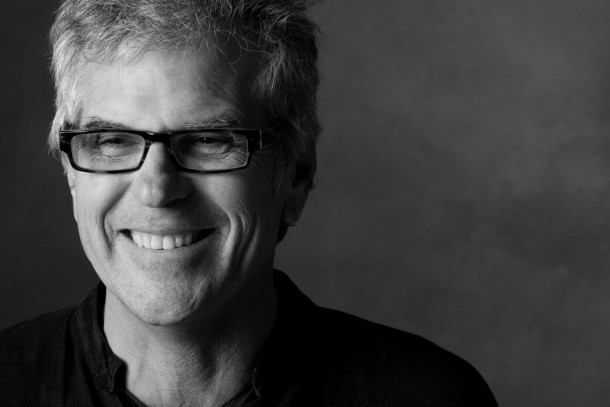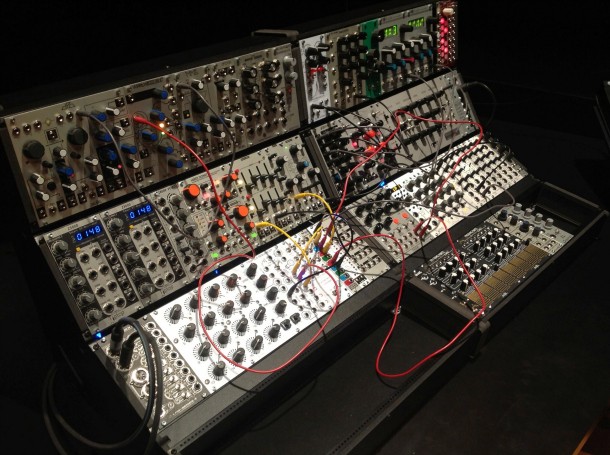Music Spotlight: Wasteland 2/Fallout: New Vegas Composer Mark Morgan

Mark Morgan's ethereal, electronic music-influenced game scores have helped convey the emotion in such games as Fallout: New Vegas, Planescape: Torment, and Need for Speed: Shift. He's currently working on Brian Fargo's much-anticipated Wasteland 2. We spoke to Morgan about his background, influences, and composition style.
For our readers, what are some of the game projects that you've worked on that they might recognize?
Of the titles I've done I would have to say Zork Nemesis, Planescape: Torment, Fallout 1-2, Fallout: New Vegas and Need For Speed: Shift are probably the most recognized.
Talk about your childhood, did you take to music early?
My mom was always playing piano so I became familiar with music around 6 or 7 years old but I didn't become serious until around 11 or 12 years. Both my parents were avid music listeners. My father was way into jazz so Miles Davis, John Coltrane and even more avant-garde stuff was being played. My mom on the other hand was listening to the music of Erik Satie and Debussy. Both my parents were fans of Stravinsky so often I would come home from surfing all day and "The Rite Of Spring" or "The Firebird" would be blasting from the stereo.
What were some of your early influences?
I believe the music my parents listened to in my formative years to this day has had a large and lasting influence. Early on from a purely acoustic playing standpoint it came from jazz players like Herbie Hancock, Keith Jarrett and Chick Corea. And from a purely awe-inspiring perspective it was The Beatles that really introduced me to more mainstream music.
Early on, did composition appeal to you, or did you want to go into pop music or rock bands?
Early on I wanted to be a studio musician so the playing aspect was really important to me. While working on numerous records and playing gigs around Los Angeles I was offered opportunities to tour with some well-known bands. One of those bands was Starship; I was their keyboard and synth player programmer for several years. On their last album I started writing some of the material and producing. This opened my eyes to the writing process and was a game changer for me. I had been on the road for a large portion of the '80s so it was time to stay home. Starship disbanded in 1990 so I focused purely on composition. I started by programming and writing additional music for established composers here in LA until I was able to get my first TV show Prey.
You went to the Berklee School of Music, talk about your experience there?
To be honest I wasn't a great student, so after staying only a few months I decided it just wasn't for me. In retrospect I probably should have stayed a taste longer and got some more theory under my belt but at the time emotionally I just wasn't there.

Your biography says that discovering electronic music was a formative experience for you? How were you exposed to it?
It really wasn't the electronic music that was as formative as much as the hardware involved in making it. I was exposed to a modular synth and it blew me away. That was the impetus for me to learn the fundamentals of synth programming.
What was the technology like when you first started experimenting with electronic music? Was it synthesizers, sequencers?
When I first started experimenting it was the age of MIDI and synths like the Jupiter, PPG, Moog, Oberheim and some Yamaha stuff. In the beginning I really didn't use sequencers that often; for me I found it hard to clock them rhythmically to other devices and it never really felt that great so I found it easier just to play it in. It wasn't until I got a NED Synclavier that the sequencer became a huge part of my workflow. The Synclavier sequencer had this ability to be so accurate timing-wise but also had this amazing feel.

Were you aware at that time of gaming and game music?
I wasn't aware at all about games let alone game music. It wasn't until the early '90s when I did my first game that I became aware of the genre.
Was it a goal to be involved in game composition or did that just happen? What was your first game project?
It was not a goal for me because I knew nothing about it. I was working on my first TV show and an agent asked if I would be interested in doing a video game. I had no idea what to do or how to do it, but I gave it a try. It was a game called Dark Seed 2. It was really painful because it was before any audio, it was all midi files but somehow I got through it. The one factor that appealed to me straight away was the visuals. The game was based on the artwork of H.R. Geiger so this opened my eyes to how cool games could look.
Describe your style and how you tailor it to fit each game?
As far as games go, or at least the kind I seem to do, be it acoustic or electronic, I can't describe it as a certain style but more of a feel. Inside those parameters there are components of Minimalism, Ambient, Tribal, Ethnic and a sound design vibe as well. A game can still be ambient but also have a thematic vibe such as Planescape, or dark ambient like Fallout, or in the case of Need For Speed done with a sound design component as storytelling. I created some tracks for a game called Giants, which were quite orchestral but still had an austere minimal vibe going on. I don't see the point in not sounding like [myself]. I hope, for better or worse, I have a style that can be heard no matter the subject or project at hand.

How does game composition differ from the other types of work you do in terms of how you approach it?
I really don't approach them all that different. In television and film you have the story, dialogue, and picture right in front of you which in some ways makes it easier to get that initial concept going. In games I suppose there is a perfect or magic concept but I haven't found that. I just think of it as a story in my head and with the help of the art and guidance from the producer I hopefully come up with the sound of the game.
Is there a game you worked on that didn't end up selling very well that you really felt you did a great job on the soundtrack and wish more people would have heard it?
Not that specifically, but to that point, I would hope a director or two would hear some of the scores before picking a composer for their project.
Talk about the Wasteland 2 and Torment projects you're working on...how did you get hooked up with inExile?
Brian Fargo called me out of the blue and said he was planning a Kickstarter for Wasteland 2 and would I be involved. Yes, I wanted to work with Brian again and Wasteland 2 would have similar DNA to Falloutso I jumped at the offer. He asked if I would write a couple of tracks for the campaign. He was able to raise the money and the game is very close to being completed. After the success of the Wasteland 2 Kickstarter campaign, he decided to move forward with a sequel to Planescape: Torment as well. That Kickstarter was also a success so I am working on two dream games. I had done essentially the prequel to both of those titles so I was very eager to revisit them.
What are your approaches musically for each of those projects?
For Wasteland 2, Brian Fargo [producer] is keen on a minimal, very dark ambient musical and sound approach. It does have a Fallout vibe but with a slightly different approach sonically. Torment: Tides of Numenera hasn't started, but I'm going to be able to use an orchestra on some of the music. It will be more thematic.
What are some of the ways you see game music evolving over the next decade as technology improves? What are some of the improvements you'd like to see?
With hours of gameplay it would be very daunting, but I think the more that games actually feel scored, the cooler that would be. It could be accomplished by new composing and implementation techniques. As far as improvements, that would come from my end by understanding more about how music works with gameplay, so as to give the player an experience even more befitting the game.

Get the Game Informer Print Edition!
Explore your favorite games in premium print format, delivered to your door.
- 10 issues per year
- Only $4.80 per issue
- Full digital magazine archive access
- Since 1991









